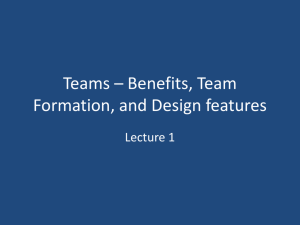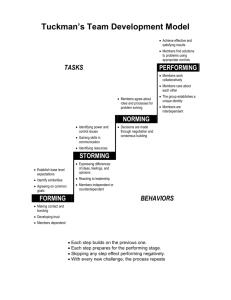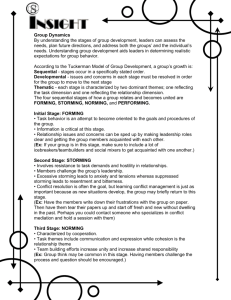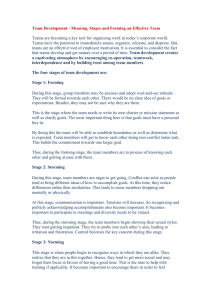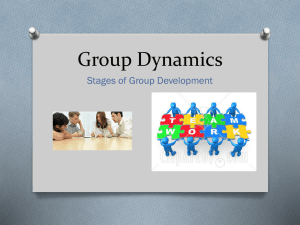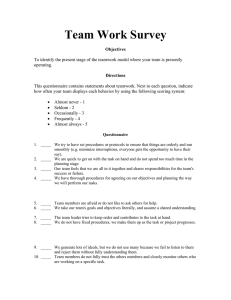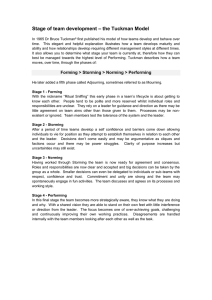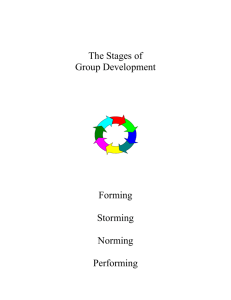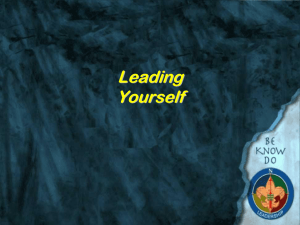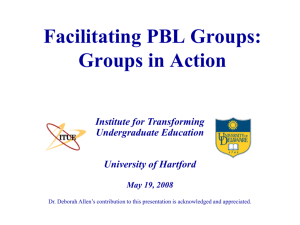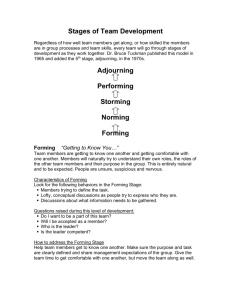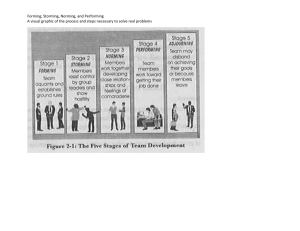Team Work
advertisement
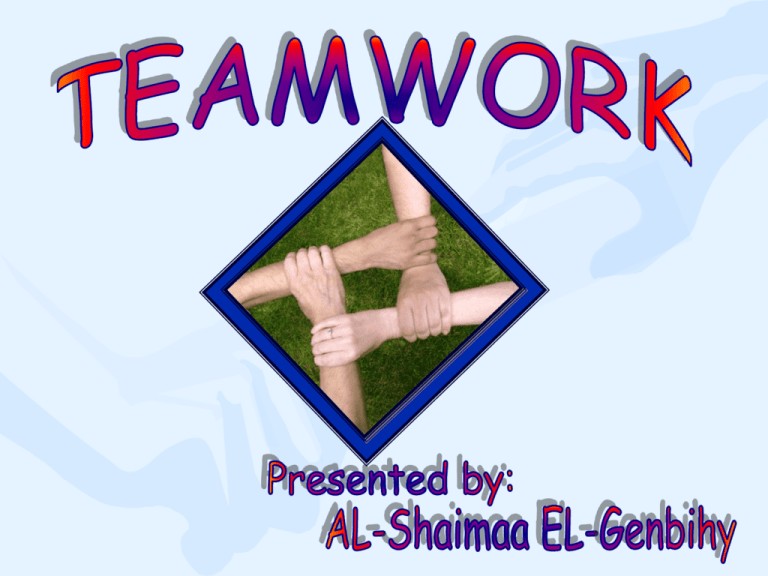
Definition:A team is a group of individuals working together to achieve a common goal. In most cases, the task is split into parts appropriate to each individual’s talents. Each member of the team has a shared responsibility for getting the job done, and therefore there cooperation is essential to the overall success of the group. From Workgroup to Teamwork 1. Working group 2. Pseudo-team 3. Potential team 4. Real team 5. High-performance team 1-Working group: No significant incremental performance need or opportunity that would require it to become a team. The members interact primarily to share information, best practices, or perspectives and to make decisions to help each individual perform within his or her area of responsibility. There is no call for either a team approach or a mutual accountability requirement. 2-Pseudo-team: This is a group for which there could be a significant, incremental performance need or opportunity, but it has not focused on collective performance and is not really trying to achieve it. It has no interest in shaping a common purpose or set of performance goals, even though it may call itself a team. Pseudo-teams are the weakest of all groups in terms of performance impact. 2-Pseudo-team: In pseudo-teams, the sum of the whole is less than the potential of the individual parts. They almost always contribute less to company performance needs than working groups because their interactions detract from each member's individual performance without delivering any joint benefits. For a pseudo-team to have the option of becoming a potential team, the group must define goals so it has something concrete to do as a team that is a valuable contribution to the company. 3-Potential team: There is a significant, incremental performance need, and it really is trying to improve its performance impact. Typically it requires more clarity about purpose, goals, or work products and more discipline in hammering out a common working approach. It has not yet established collective accountability. Potential teams abound in organizations. When a team approach makes sense, the performance impact can be high. The steepest performance gain comes between a potential team and a real team; but any movement up the slope is worth pursuing. 4-Real team: This is a small number of people with complementary skills who are equally committed to a common purpose, goals, and working approach for which they hold themselves mutually accountable. Real teams are a basic unit of performance. The possible performance impact for the real team is significantly higher than the working group. 5-High-performance team: This is a group that meets all the conditions of real teams and has members who are also deeply committed to one another's personal growth and success. That commitment usually transcends the team. The high performance team significantly outperforms all other like teams, and outperforms all reasonable expectations given its membership. It is a powerful possibility and an excellent model for all real and potential teams. Effective teams 1. Have a common purpose ( a big picture) they are all committed to. (Vision & team charter). 2. Listen intently to each other and respect each other’s views and opinions. (Communication) 3. Are concerned about how their actions and attitudes affect one another. (Respect) 4. Are sensitive to each other’s need. (Support) 5. Work on building positive environment and stay involved. (commitment) 6. Are willing to invest time and money to protect and enhance to team fabric. (Accountability) Effective teams 7. Encourage the participation of every member. (Empowerment) 8. Talk about and discuss their performance as individuals and as a team. (Coaching and feedback) 9. Genuinely care about each other and believe in the talents and skills of one another. (Trust) Team Models 1. Sequential Teams 2. Parallel Team 3. Synchronous Team 4. Virtual Teams 5. Networked Teams Sequential Teams One person’s work output becomes work input for the next person. The team members are caring about their own tasks and nothing else. It is quite efficient when there is a low need for interaction and a predictable, repeating process. The project have many people working over a long period of time and it is not important that the whole project team be assembled in one place at one time. Sequential Teams It is a solo performances coordinated by a single director. the overall team is managed with a top down style (Autocratic style). The advantage of this model is, team member specialization. The sequential model works well for a virtual team that is not physically together every day. Parallel Team A parallel team is very much like an orchestra. large projects require many specialists, and tasks must converge and be done at the same time. Disaster. ( Example) The team rehearses is must to assure that each person knows what to do and exactly when. Parallel Team This team has independence and interdependence at the same time. The team manager is responsible for keeping the team members all together, on time. Synchronous Team This team is small for maximum interaction and freedom to try new ideas. For example, a new product development team. What is needed for this project? free flowing communication. ideas explored. The team keep focusing on the project objective and find a way to get there. Synchronous Team Often you have a cross functional team with specialists from various disciplines The manager of this team is more like a facilitator than an autocrat. The management style needs to be supportive. The manager should be a barrier buster. Synchronous Team Size is a critical consideration, a synchronous team needs to be relatively small. Assay: “You can put three or four or maybe five people around a white board and they can do design together. But you can’t put twenty people around a white board.” Virtual Teams A team which its member are not together. Virtual team is an oxymoron. A geographically dispersed work group can never achieve the gel that makes at team greater than the sum of its parts. It is hard to get a team to gel if they have never met each other, (Challenge)? Virtual Teams Cultural differences compound the problems facing virtual teams. (The greater the differences, the greater the problems) (challenge) Make a continues meeting to let the team member know each other (video conference). Corporate sales team. (Example) Networked Teams Some complex projects require multiple teams to get the job done. Each team has it’s own personality. Leader spend a great deal of time encouraging individuals to respect one another and support the team, which must be the same with teams. Each team must show respect for the other teams, and support one another. Networked Teams The team independency may cause a lot of clashes. Core leadership team is recommended The core leadership team deals with how to get the divergent teams to work together and focuses on cross-functional issues. Team membership should be as stable as possible. Problem solving team. (Example) Stages of groups development 1. Forming 2. Storming 3. Norming 4. Performing Stages of groups development Forming Storming Performing Norming Forming Group members meeting to set the group's purpose, structure, and activities. A period of uncertainty and testing. By the end of this stage, members have become acquainted both with each other and with the goals and tasks ahead. Forming Storming Members clash with each other. The name of this stage reflects the stormy interactions. Disagreements may replace the cautious reservations voiced during the forming stage. Even when titles and responsibilities are clearly defined, members may jockey for position within the group. Storming Norming On this stage members understand and accept their roles and responsibilities. Members agree on the goals and the methods for achieving goals; they begin to conform to group norms of performance and interpersonal relations. As a result, the group becomes more cohesive. Norming performing The group is fully functional and moving ahead to achieve its goals. Members interact with other members to keep the group on track. Group members can effectively deal with any problems or conflicts performance. This is the most productive stage of group development. Performing Team Life Cycle (A team is a living organism) 1. Birth 2. Growth (adolescence) 3. Maturity 4. Decay (senility) 5. Death Growth Maturity Birth Decay (Senility) Death Low Effectiveness High Team Life Cycle Low Cohesiveness High Words About Teamwork There is no "I" in "Team“. Many hands make light work. No man is an island. A team is a living organism. Work with nature, do not put a senile team in the life support. Teams are dealing with win-win relationship. Words About Teamwork No matter what you are trying to do, “TEAMS” are the most effective way to get the job done. There are two ways of spreading light: to be the candle or the mirror that reflects it. Play Role • Divide the group into teams with maximum 15 members for each team. • Choose team leader to present the team. • In 30 minutes make small project using the available tools and equipments. • Present the project in maximum 5 minutes. Email: alsh_elgenbihy@yahoo.co.uk
